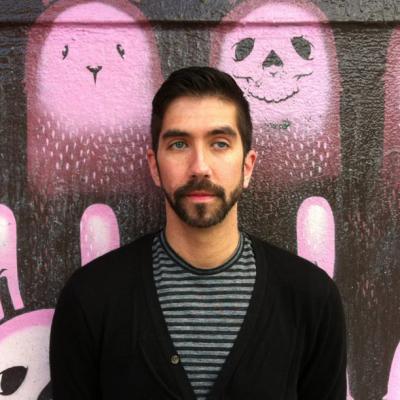
Curran Nault is a scholar of grassroots queer transmedia art and activism. His work on subcultural media formations brings LGBTQ+, feminist, trans and BIPOC theories—and the possibilities they conjure—to bear on the cultural artifacts, practices and politics of D.I.Y. (do-it-yourself) communities and creativities. His scholarship has been published in such journals as Camera Obscura, Transgender Studies Quarterly, Jump Cut, Feminist Media Studies, and the Journal of Film and Video, and has been anthologized in several collections, including Mediated Girlhoods II, Queer Love in Film and Television and the Oxford Handbook of Queer Cinema and Oxford Handbook of Punk. Curran is a Faculty Affiliate of the Department of Women’s Gender and Sexuality Studies/LGBTQ+ Studies and the Center for Asian American Studies.
Curran’s first book, Queercore: Queer Punk Media Subculture (Routledge, 2018) considers the histories, politics, and practices of queercore: a queer punk transmedia subculture that surfaced in the 1980s/90s, as a dual response to a rise in anti-queer/trans violence and the mainstreaming of “respectable” gays and lesbians via emerging politics of marriage and the military. A text about a formative grassroots queer art and activist subculture, Queercore employs ethnographic methods and queer/media theory insights to establish the oppositional values and aesthetics central to queercore’s subcultural distinction, as well as its paradigmatic DIY political economy, asserting an alternative model to the dominant media industries and a corporatized ‘gaystream.’
Curran’s second book project entitled Radical Remains: Queer Creation at the Ends entertains acts of queer cultural resistance, with an art-centered analysis of queer creation and continuance, as set against repressive rhetorics of the ends within the apocalypse now. Radical Remains aims to wrest readers away from superficial seductions of ‘the new’ toward a richer realm of under-researched and under-valued ‘remains’: aged subcultural queer strategies and sensibilities that are revivified as present provocations. This means studying the substance of queer subcultural aesthetics and practices that, under harsh, ongoing damage and depletion, are neither entirely defeated nor entirely successful in securing the alternative conditions that would no longer require acts of endurance. Threaded through the chapters of Radical Remains is an ambitious claim that there is something inextinguishable about queer creation as it advances across, and is often emboldened in opposition to, colonial capitalist architectures of the end: capitalist calls to divestiture rooted in imperial violence.
A public-facing scholar, Curran is also an arts organizer. Curran is the Founder and Artistic Director of OUTsider, a queer transmedia arts non-profit that serves as an incubator for his scholarly pursuits, and as a means of making his research more accessible to the general public—building it back into the commons. Via OUTsider’s annual five-day festival and academic conference, Curran has introduced Austin to such luminaries as Zackary Drucker (Transparent), Silas Howard (Pose), Cassils (Carving) and Xandra Ibarra (La Chica Boom). OUTsider is a recipient of numerous grants, including from the National Endowment of the Arts. In 2018, OUTsider was nominated by the Austin Critics Table as Austin’s “Best Independent Arts Project.” Curran is also the Co-Founder, and former Director of Programming, of the Austin Asian American Film Festival, and is the former Artistic Director of aGLIFF (Austin Gay & Lesbian International Film Festival). Finally, Curran is a co-producer of the award-winning documentaries Before You Know It (PJ Raval, 2013) and Call Her Ganda (PJ Raval, 2018).

